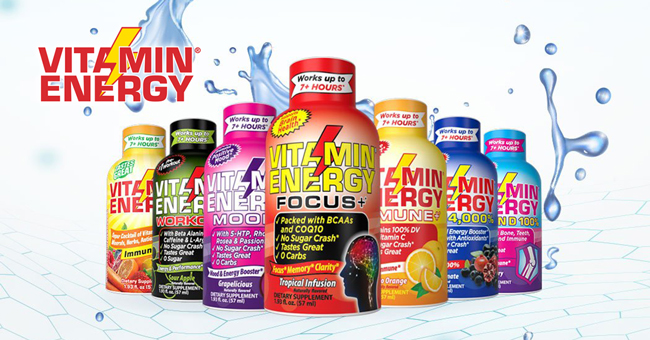Offering a line of functional energy shots tailored to niche use occasions, Vitamin Energy is seeking to gain a foothold with health and wellness-minded consumers looking for a better-for-you alternative to mainstream shots brands.
Founded in 2018, the New York-based company reported 714% growth in the convenience channel since March. According to Molly Jacobson, the company’s VP of communications for, Vitamin Energy’s focus on differentiated, function-based SKUs was influenced by the rush of innovation in the traditional energy drink category, which has seen a surge in growth the past several years bolstered by the rise of brands such as Bang, C4 and CELSIUS, which feature low- and no-calorie offerings as well as ingredients like BCAAs and nootropics. However, Jacobson said the shots space has wanted for a similar disruption.
Vitamin Energy’s line of 2 oz. shots line includes Immune+ (with Vitamin C), Focus+ (with BCAAs), Workout+ (beta alanine and L-Arginine), Mood+ (rhodiola, rosea and passionflower), Immune+ Cocktail, Vitamin D+ and B12 14,000%. All products contain 260 mg of caffeine per bottle.
The focus on differing use occasions, Jacobson said, has helped the brand bring in a different base of consumers from most competing energy shot brands, including those who had previously left the category. The brand’s demographics skew towards women, but largely target on-the-go shoppers.
“Our customers are actually pretty unique for this market,” Jacobson said. “Our customers are the soccer moms, they’re truck drivers, they’re parents and in general are hardworking individuals who are looking to get some energy with their vitamins.”
The Vitamin Energy brand was originally founded in the 2000s by Glaceau, the then-independent maker of Vitaminwater, which launched it as a 12 oz. energy drink. After Glaceau’s acquisition by The Coca-Cola Company in 2007, the line was discontinued due to Coke’s non-compete clause with Monster Energy. From there, it lay dormant until 2017 when a group of private investors purchased the trademark for an undisclosed sum and began retooling Vitamin Energy into its current version.
The current leadership team features several executives with prior experience in the shots space, including president and CEO Nick Mihnovets, who previously served as VP and general manager of Tweaker Energy Company; VP of business development Larry Greenway, also a Tweaker vet; and sales head Jay Bird, who previously served as VP of sales at Nitro 2 Go.
Jacobson said the company has taken a traditional grassroots brand building approach — it started going door to door in New York City with a small sales team before expanding operations in 2019. The products are currently available in over 10,000 stores nationwide, including chains such as Circle K, Pilot Flying J, QuikTrip and 7-Eleven.
The energy shot category has long been dominated by Living Essentials LLC, the makers of 5-Hour Energy. According to market research firm IRI, 5 Hour Energy reported a 10.4% decline in dollar sales to $833 million for the 52-week period ending October 4, 2020, resulting in a drag that has brought the entire category down 9.5% in the same period to $939 million. Other top ranking brands, such as Tweaker (down 2.4% to $20 million) and Stacker (down 10.3% to $13 million) also reported declines in this period. However, companies such as VPX Pharmaceuticals, which owns the Bang brand, have seen shots sales improve over the past twelve months, as have wellness-oriented juice shot companies that produce energy lines, like So Good So You and Pickle Juice.
Not unlike juice shots, Vitamin Energy has managed to grow by tailoring its messaging around health and wellness, a move that has been bolstered by the COVID-19 pandemic and consumer trends towards immunity-boosting products. This year, the brand’s Immune+ SKU became the top selling energy shot product on Amazon and is currently ranked in the top three.
Despite surpassing seven-figures in revenue last year, the company acknowledged that its growth in retail was impacted by the pandemic and said it “cannot imagine what will happen as foot traffic increases.” Vitamin Energy has also turned to social media marketing to drive ecommerce, including through platforms like TikTok, Amazon Prime, Snapchat, Facebook, Instagram and Google Display.
“I think what happened is the pandemic pressed fast forward on what was already happening in the markets,” Jacobson said. “People are more health focused and are seeking out ways to be more aware, more conscientious. They’re reading their labels, they’re looking at the ingredients, they know what they’re putting in their bodies — as they should.”
Looking ahead, Jacobson said the brand will continue to focus on innovation, though she did not comment on what types of products Vitamin Energy is exploring aside from stating that it will continue to focus on the shot format for the foreseeable future. The company will also continue to focus on growing its footprint and although much of the growth to date has been in convenience and ecommerce, the brand will look towards expanding in all channels.
“COVID really changed things and I think everything grew very, very quickly for us,” she said. “So it’s great that we can offer what people are seeking in these trying times, and we’ll continue growing from here on out. We’ve definitely secured our place in the market and as we develop such a strong following I know, that as we continue on past these really difficult times, that we’ll be able to maintain our growth.”
